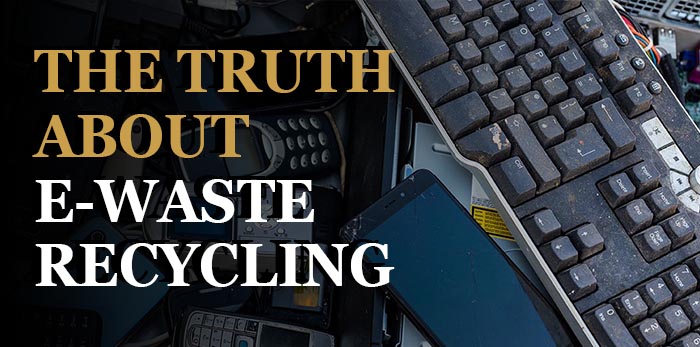
The Dirty Secret Behind “Recycling” Your Old Electronics
You know that feeling of moral victory when you finally drop off that crusty old laptop or outdated flip phone at a “recycling” bin? Cue the imaginary gold star on your chest—you’re saving the planet!
…Except, plot twist: a large chunk of that “recycled” tech ends up doing a world tour—straight to a landfill, or worse, an unregulated junkyard overseas.
Let’s break it down (pun intended):
- 29% of e-waste? Straight to landfills.
- 40%? Exported overseas.
- The rest? Either incinerated or just… tossed in storage to think about what it’s done.
In many developing countries, people are disassembling these devices by hand, often with zero protective gear. Imagine cracking open a 2007 Dell tower and getting a face full of mercury and neurotoxins. Not exactly a wellness retreat.
The results? Higher lead levels, spontaneous abortions, cancer risks, and all sorts of horrifying words you’d rather not associate with a busted iPhone.
But wait—it gets worse!
Your data isn’t safe either.
Since this whole international recycling gig is the Wild West (read: unregulated and unlicensed), your photos, passwords, credit card info, and all those “definitely deleted” files could be floating around in someone’s black-market bargain bin.
And as of 2021, there’s no federal law in the U.S. stopping any of this.
A Failed Attempt at Doing the Right Thing
Back in 2004, Dell and Goodwill said, “Let’s fix this!” and launched a recycling program. They accepted any old computer, promising to dispose of them “responsibly.” Sounds good, right?
Except—plot twist #2—they were secretly shipping that junk off to Southeast Asia. The average “recycled” device traveled over 2,500 miles. Apparently, it’s not e-waste until it gets frequent flyer miles.
Staples and Best Buy also offer similar programs. Sadly, many of those devices take a one-way trip to a landfill or get dumped in places like Hong Kong or West Africa, where folks risk their health to strip out bits of copper and gold.
So… What Can You Do?
The best move? Don’t recycle—revive.
Keep your tech running as long as possible. That laptop from 2017? Still got some juice in it! Your desktop from 2015? Give it a little love, and it’ll keep purring like a confused but loyal toaster.
Here’s how to keep your computer happy and out of a toxic dump:
- 🔄 Weekly: Run OS updates, malware scans, and backups.
- 🐶 Yearly: Clear the dust bunnies and pet hair from your fans.
- 💾 Always: Keep your C: drive below 90% full—computers hate being bloated.
- ❄️ Every three years: Re-apply CPU thermal paste (like skincare, but for CPUs).
- ⚡ ASAP: Replace your old-school hard drive with a snazzy SSD for faster boot times and longer life.
TL;DR – Recycling tech feels good. But most of the time, it’s a smokescreen for something shady. Keeping your devices alive longer is better for your wallet, your data, and, believe it or not, the planet.
So go ahead—hug your laptop today. And maybe clean the crumbs out of the keyboard while you’re at it.
Sources; additional information:
Columbia University •Vice • The Verge • 60 Minutes
